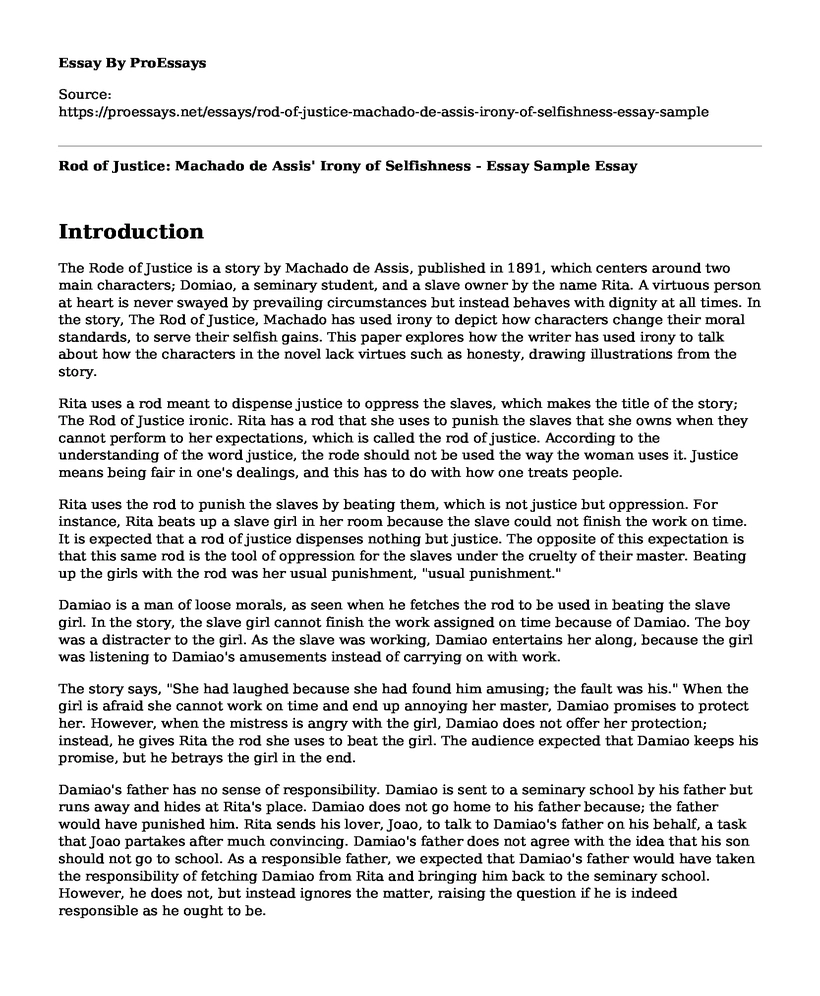Introduction
The Rode of Justice is a story by Machado de Assis, published in 1891, which centers around two main characters; Domiao, a seminary student, and a slave owner by the name Rita. A virtuous person at heart is never swayed by prevailing circumstances but instead behaves with dignity at all times. In the story, The Rod of Justice, Machado has used irony to depict how characters change their moral standards, to serve their selfish gains. This paper explores how the writer has used irony to talk about how the characters in the novel lack virtues such as honesty, drawing illustrations from the story.
Rita uses a rod meant to dispense justice to oppress the slaves, which makes the title of the story; The Rod of Justice ironic. Rita has a rod that she uses to punish the slaves that she owns when they cannot perform to her expectations, which is called the rod of justice. According to the understanding of the word justice, the rode should not be used the way the woman uses it. Justice means being fair in one's dealings, and this has to do with how one treats people.
Rita uses the rod to punish the slaves by beating them, which is not justice but oppression. For instance, Rita beats up a slave girl in her room because the slave could not finish the work on time. It is expected that a rod of justice dispenses nothing but justice. The opposite of this expectation is that this same rod is the tool of oppression for the slaves under the cruelty of their master. Beating up the girls with the rod was her usual punishment, "usual punishment."
Damiao is a man of loose morals, as seen when he fetches the rod to be used in beating the slave girl. In the story, the slave girl cannot finish the work assigned on time because of Damiao. The boy was a distracter to the girl. As the slave was working, Damiao entertains her along, because the girl was listening to Damiao's amusements instead of carrying on with work.
The story says, "She had laughed because she had found him amusing; the fault was his." When the girl is afraid she cannot work on time and end up annoying her master, Damiao promises to protect her. However, when the mistress is angry with the girl, Damiao does not offer her protection; instead, he gives Rita the rod she uses to beat the girl. The audience expected that Damiao keeps his promise, but he betrays the girl in the end.
Damiao's father has no sense of responsibility. Damiao is sent to a seminary school by his father but runs away and hides at Rita's place. Damiao does not go home to his father because; the father would have punished him. Rita sends his lover, Joao, to talk to Damiao's father on his behalf, a task that Joao partakes after much convincing. Damiao's father does not agree with the idea that his son should not go to school. As a responsible father, we expected that Damiao's father would have taken the responsibility of fetching Damiao from Rita and bringing him back to the seminary school. However, he does not, but instead ignores the matter, raising the question if he is indeed responsible as he ought to be.
It is therefore valid that the characters in the story are not virtues as their morals are questionable, as they change their moral standards to serve their needs. Damiao cannot protect the slave girl so that he is not chased away by Rita, while Damiao's father is never responsible, even though he sends his son to the seminary. The writer has employed irony to unravel these wavering morals in the characters.
Cite this page
Rod of Justice: Machado de Assis' Irony of Selfishness - Essay Sample. (2023, Aug 12). Retrieved from https://proessays.net/essays/rod-of-justice-machado-de-assis-irony-of-selfishness-essay-sample
If you are the original author of this essay and no longer wish to have it published on the ProEssays website, please click below to request its removal:
- Historical, Cultural and Artistic Civilization in Gilgamesh Essay
- Invictus by John Carlin Essay Example
- Essay on Writing: A Skill to Be Learned or an Innate Talent?
- Comparison of The Movie the Wizard of Oz and The Book the Wonderful Wizard of Oz Essay
- How Religion Contributes to the Formation of Monsters in Beowulf - Essay Sample
- Analysis of the Film Fences
- Essay Example on Nobody or Somebody? Exploring Emily Dickinson's Poem







